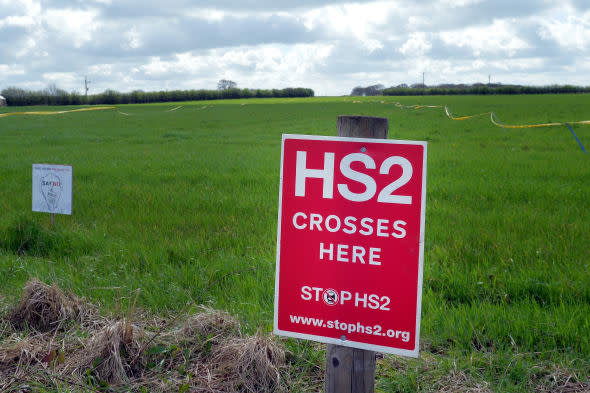Around 500 British wildlife sites 'at risk from HS2'

Around 500 wildlife sites will be affected by the development of the planned high speed rail line from London, conservationists have warned.
Estimates by the Wildlife Trusts suggested the proposed HS2 scheme will damage and destroy more wildlife habitat and populations of wild species than it will take steps to replace. Source: PA
A report by the Trusts, who oppose HS2, called on the Government to back the creation of a ribbon of natural areas running the length of the route to protect and restore the countryside and communities if the project goes ahead.
The environmental project would create habitats stretching 1km (0.6 miles) to either side of the rail line and "green bridges" with trees, grass and hedges spanning the track to link up areas divided by the scheme.
The work to create 15,000 hectares (37,000 acres) of wetlands, grasslands and woods and 120 miles of new footpaths and cycle routes would initially cost just £130 million, less than 1% of the total cost of HS2, the report said.
The Wildlife Trusts said the current proposals for HS2, in phase one of the project to Birmingham and phase two to Manchester and Leeds, would directly or indirectly affect hundreds of wildlife sites including 10 Sites of Special Scientific Interest.
Some 150 existing and 43 proposed local wildlife sites would be affected, including 43 ancient woods and nine Wildlife Trust nature reserves.
The Trusts also warned that while the development is intended to lead to no net loss of wildlife habitats and species, the measures outlined so far would fall short of replacing what was lost.
London Wildlife Trust estimates that 150 hectares (370 acres) of wildlife habitat will be lost or damaged in the capital, but just 97 hectares (240 acres) of new or enhanced habitat will be created.
A review commissioned by Berkshire, Buckinghamshire and Oxfordshire Wildlife Trust on the impact of HS2 on Bechstein's bats and the proposed measures to protect them, found that without major changes to the route, one of the UK's rarest mammals could suffer local extinction.
The Wildlife Trusts director of England, Stephen Trotter, said: "Currently, people and nature stand to lose if HS2 goes ahead which is why our opposition to the proposed route for HS2 remains. Like other affected groups we will be petitioning against it.
"The Government needs to act now to set out an ambitious plan for restoring nature along the length of the route, if construction goes ahead, otherwise the environmental impacts will not be satisfactorily mitigated.
"The greener vision for HS2 that we have published today shows that it would be feasible to create around 15,000 hectares of new, interlinked wild places established along the entire length of the route that people can walk, cycle through and enjoy, ultimately providing a 'net gain' for wildlife."
Related articles
New £32bn UK high speed rail link 'to be approved'
Route for northern UK high speed rail link revealed




